News
For older news between 2021-22 please visit our news archive.
Dr Kyle Wedgwood and Dr Nicolas Verschueren attended the conference "XIX International Workshop on Instabilities and Nonequilibrium Structures – INES 2023", during the first week of December 2023 at the Pontificia Universidad Catolica de Valparaiso (Valparaiso, Chile). Both investigators from the HUB contributed to this workshop with presentations. More details about the conference can be found in the following link: https://www.cec.uchile.cl/~lafer/IndexINES-2023.htm
After the conference, Kyle and Nicolas visited the three following research groups in Santiago (the capital city of Chile).
1-Laboratorio de Neurosistemas (Facultad de Medicina Norte, Universidad de Chile)
The investigators met Professor Pedro Maldonado, head of the "Laboratorio de Neurosistemas"(https://neurosistemas.cl/ ).
2-The modelling and computational biology research cluster, part of the "fundacion ciencia y vida"
In a meeting with the director of the institute, Tomás Pérez-Acle, the Hub investigators learnt about the research conducted at the institute "Fundacion Ciencia y Vida" (https://cienciavida.org/)
3-Brainlat institute (Universidad Adolfo Ibáñez, sede Santiago)
The Hub investigators met with the researchers of the BrailLat institute (https://brainlat.uai.cl/) Dr. Enzo Tagliazucchi, and Dr. Vicente Medel. In this half-a-day-event the resprentatives of both groups presented and discussed their work.
The purpose of these visits was to discuss possible future collaborations.
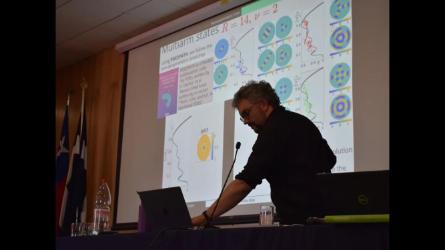
Dr Verschueren (above) and Dr Wedgwood (below) presenting their respective works at the conference in Valparaiso

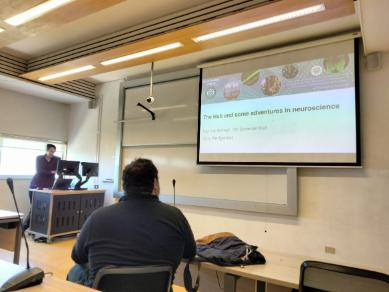
(above) Dr Wedgwood presenting at BrainLat institute at Universidad Adolfo Ibañez. (below)
Universidad Adolfo Ibañez, home of the BrainLat Institute.
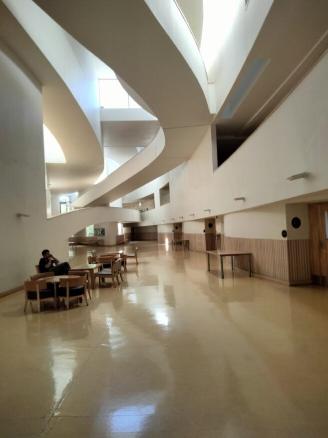
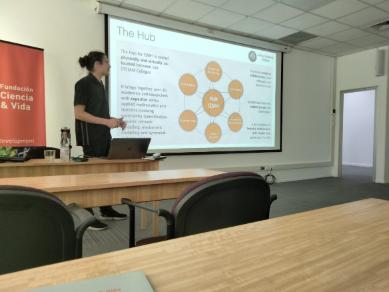
(Above) Dr Wedgwood introducing the different lines of research of the Hub at Fundacion Ciencia y Vida. (Below) Dr Wedgwood and Dr Verschueren visiting Viña del Mar after the conference in Valparaiso
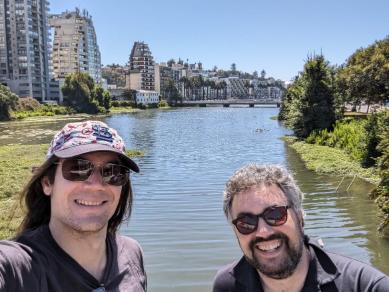
The Hub's 2023 Christmas dinner took place on November 30th at a popular Spanish restaurant in Exeter. Organized by PhD students Henry Kerr and Kate Nechyporenko, around 16 researchers gathered for a relaxed evening of socializing before the year-end break.
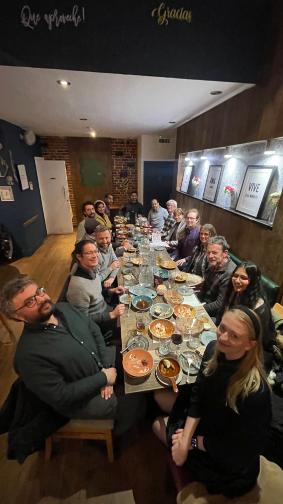
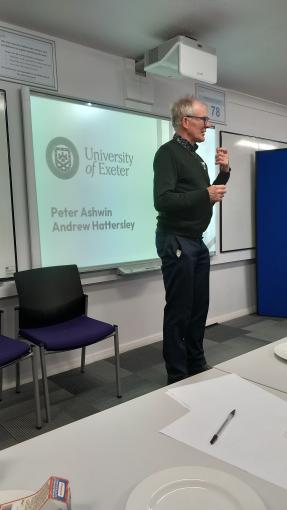
On November 23, 2023, an afternoon research meeting at Baring Court (Medical School, University of Exeter) brought together 35 researchers from the EPSRC Hub for Quantitative Modelling in Healthcare and EXCEED (Exeter Centre of Excellence for Diabetes Research). Organized by researchers from both groups, the event aimed to showcase diverse research lines and foster future collaborations. Presentations by leading researchers included Professor Krasimira Tsaneva-Atanasova and Professor Peter Ashwin from the mathematical modelling group, along with insights from Professor Andrew Hattersley in diabetes research. The core of the meeting featured 20 flash talks followed by a miniposter discussion session.
A team led by Professor Robert Beardmore (part of the leadership team in the hub) in collaboration with Dr Emily Dickens (research fellow in the hub), Pablo Catalan (Universidad Carlos II), and Jon Iredell (University of Sydney); recently received an innovation award in the Vivli Antimicrobial Resistance (AMR) Surveillance Open Data Re-Use Data Challenge.
The challenge, funded by Wellcome Trust, aims to promote the inventive reutilization of the wealth of surveillance data available within the AMR Register. Among the 56 participating teams, only five obtained a prize. Team 8923, led by Professor Beardmore, was one of the two teams to receive the innovation award.
Congratulations to Emily and Robert on this remarkable achievement!
For more details about their project and the challenge, you can visit this link: https://amr.vivli.org/data-challenge/finalist-and-award-winning-solutions/
In a captivating discussion on Soundart Radio, a Devon-based community radio station, the spotlight was on Kyle Wedgwood, a brilliant lecturer in the Department of Mathematics and Statistics and a prominent member of the prestigious EPSRC Hub for Quantitative Modelling in Healthcare. The topic of the hour? The fascinating application of mathematics in understanding the complexities of life.
The 2023 SIAM Conference on Dynamical Systems witnessed a remarkable display of expertise and innovation from members of the EPSRC Hub for Quantitative Modelling in Healthcare. This prestigious event, which brings together leading minds in the field of dynamical systems, saw the Hub's researchers making significant contributions across a range of topics, from microbiome analysis to tipping points in natural systems and biomedical applications of wave theory.
Professor Krasimira Tsaneva: Microbiome Dynamics Unveiled Through Compositional Analysis
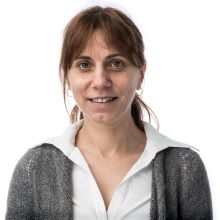
Professor Krasimira Tsaneva, leader and principal investigator of the EPSRC Hub, co-authored a groundbreaking study titled "Compositional Analysis of Microbiome Data Reveals Time-Dependent Effects of Antibiotic Treatment" presented at the time series analysis session.This work introduces a CODA-based ‘in-the-simplex’ approach for longitudinal microbiome data analysis in patients with chronic respiratory disease recruited as part of a placebo-controlled clinical trial evaluating the efficacy of treatment. This CODA-based 'in-the-simplex' approach for microbiome data opens up new avenues for further research and has the potential to inform future personalized interventions.
Professor Peter Ashwin: Unraveling Tipping Points and Uncertainty in Natural Systems
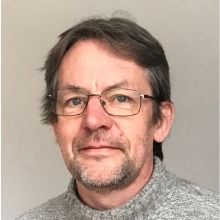
Professor Peter Ashwin, theoretical co-investigator of the EPSRC Hub, showcased his leadership and research prowess by organizing the session "Tipping Points in Natural Systems; Theory and Applications " which brought together theorists working on advancing the mathematical knowledge of systems exhibiting tipping behavior and those studying the (models of) natural systems that might tip. Furthermore, offering novel insights into the behavior of complex systems, Professor Ashwin co-authored the following impactful studies:
- "Rate-Induced Tipping from Chaotic Attractors"
- "Uncertainty Quantification for Tipping Points of the Atlantic Meridional Overturning Circulation"
- "Morphogen-Directed Cell Fate Boundaries: Slow Passage Through Bifurcation and the Role of Folded Saddles"
Dr. Kyle Wedwood: Bridging Generative Models and Biomedical Dynamics
Dr. Kyle Wedwood, another brilliant mind from the EPSRC Hub, presented the study "Morphogen-Directed Cell Fate Boundaries: Slow Passage Through Bifurcation and the Role of Folded Saddles," where he shows how folded saddles can successfully model acquisition of three cell fates to produce `French flag' patterning, as well as for a more realistic model of cell fate dynamics in terms of two mutually inhibiting transcription factors. Additionally, looking at accurate predictions and deeper insights into complex biological systems, Dr. Wedwood co-authored two significant papers:
- "Deep Hybrid Modeling of Circadian Neuronal Excitability Using Generative Adversarial Networks"
- "Phase Transitions, Heterogeneity, and Coordination in Pancreatic Beta-Cell Networks."
Dr. Nicolas Verschueren: Unveiling Waves in Biomedical Sciences
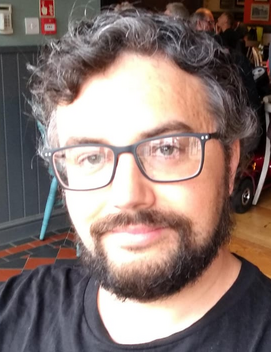
Dr. Nicolas Verschueren's influence was palpable through his session organization and presentation. His session, "Waves: Theory and Applications to Biomedical Sciences," brought together experts exploring the role of waves in understanding various biological phenomena. Dr. Verschueren himself presented the study "Eckhaus Instability in the Lugiato-Lefever Model," elucidating ttheoretically the primary and secondary instabilities undergone by the stationary periodic patterns in the Lugiato-Lefever equation in the focusing regime.
The 2023 SIAM Conference on Dynamical Systems was a melting pot of innovative ideas and collaborative efforts. The EPSRC Hub for Quantitative Modelling in Healthcare members left an indelible mark on the conference, advancing the field's understanding of complex dynamics across various domains and offering promising avenues for future research. Their multifaceted contributions underscore the importance of quantitative modelling in unraveling the mysteries of dynamic systems, further solidifying their position as innovators in applications of mathematics to healthcare.
In a remarkable achievement for the EPSRC Hub for Quantitative Modelling in Healthcare, Dr. Nicolas Verschueren Van Rees has secured the Researcher-Led Initiative Award, in collaboration with researchers Dr Pia Leete and Dr James Crichton. The award, offered by the Researcher Development and Research Culture (RD&RC) team at the University of Exeter, has facilitated the creation of an exceptional workshop on Image Analysis which garnered attention and participation from across the academic community.

Empowering Researchers Through Knowledge Sharing: A Dynamic Workshop on Image Analysis
Dr. Nicolas Verschueren Van Rees, a distinguished member of the EPSRC Hub, demonstrated his commitment to fostering collaboration and enhancing skills among fellow researchers through this visionary initiative. The recently concluded workshop, hosted at the St Luke's Campus of the University of Exeter, achieved resounding success by attracting over 40 participants eager to delve into the intricacies of Image Analysis.
An Immersive Learning Experience: Three Key Components
The workshop was structured into three comprehensive segments, each catering to different levels of expertise and knowledge in Image Analysis:
-
Introduction to ImageJ: Attendees were provided with a foundational understanding of Image Analysis through an interactive session introducing the widely-used ImageJ software. Dr. James Crichton guided participants through the basics, ensuring a strong footing for the subsequent modules.
-
Basic Guide to QuPath: Building on the foundational knowledge from the previous session, participants delved deeper into the world of Image Analysis using QuPath. This portion was led by Dr. Nicolás Verschueren.
Fostering Collaboration and Skill Enhancement
Dr. Nicolas Verschueren Van Rees, Pia Leete, and James Crichton, through their collective efforts, created an environment conducive to knowledge sharing, skill enhancement, and vibrant academic exchange. The Researcher-Led Initiative Award not only recognized their dedication but also exemplified the University of Exeter's commitment to supporting innovative endeavors that enrich the research culture.
A Testament to Collaboration and Vision
The success of the Image Analysis workshop stands as a testament to the power of collaboration and the vision of researchers like Dr. Nicolas Verschueren Van Rees, Pia Leete, and James Crichton. By leveraging the resources offered by the Researcher-Led Initiative Award, they have left an indelible mark on the academic community, equipping researchers with essential skills and fostering a culture of continuous learning.
As the EPSRC Hub for Quantitative Modelling in Healthcare continues to drive innovation and excellence, this achievement reinforces its position as a pioneer in advancing interdisciplinary research, enriching knowledge, and propelling the boundaries of scientific exploration.
In a bid to demystify the complex world of cerebral aneurysms and enhance patient care, Dr. B. Jayanand Sudhir, an Additional Professor in the Department of Neurosurgery at the Sree Chitra Tirunal Institute for Medical Sciences and Technology in Trivandrum, India, delivered an enlightening seminar at LSI Seminar Room A on the intricacies of blood flow within these potentially lethal lesions. The event, titled "The Virtual Rainbow and Real Red World of Blood Flow in Cerebral Aneurysms: A Neurosurgeon’s Perspective," delved into the challenges of predicting aneurysm rupture and the promising role of Computational Fluid Dynamics (CFD) in revolutionizing patient-specific care.

Dr. B. Jayanand Sudhir
Cerebral aneurysms, sac-like dilations in the blood vessels of the brain, pose a significant threat due to their potential to rupture, leading to subarachnoid hemorrhage and often proving fatal. Traditionally, decisions regarding the management of these aneurysms have been based on factors such as aneurysm size, pooled statistical data, comorbid illnesses, smoking history, and ethnicity. However, Dr. Sudhir emphasized that size alone is not a foolproof indicator, as even smaller aneurysms can rupture, and more precise methodologies are needed to predict their behavior.
One of the key insights shared during the seminar was the importance of hemodynamic and structural characteristics in determining the rupture risk of an aneurysm. Dr. Sudhir explained that while these factors play a pivotal role, there has been a reluctance in adopting patient-specific simulations generated through CFD and Fluid-Structure Interaction studies in clinical decision-making.
Computational Fluid Dynamics allows for the creation of precise simulations that can generate hemodynamic flow parameters and stress distributions within aneurysms, giving clinicians a deeper understanding of each patient's unique condition. However, these advanced tools have not yet found widespread use among neurosurgeons due to barriers such as a lack of familiarity with engineering concepts, challenges in interpreting results, and concerns about reliability.
Dr. Sudhir's talk served as a bridge between the world of CFD simulations represented by the virtual rainbow (VIBGYOR) and the harsh realities of blood (RED) in the human body. He stressed the importance of developing a reliable predictive model, which requires accumulating data from a large pool of aneurysm cases.
The seminar also acknowledged the significant support received from the Science and Engineering Research Board (SERB) and the National Supercomputing Mission (NSM), both funded by the Government of India. These grants have played a crucial role in advancing research efforts aimed at unraveling the complexities of cerebral aneurysms and improving patient outcomes.
MiLS meeting on "Linking Mathematics, Experiments and Data" 8th-9th March 2023, University of Exeter
The meeting focused on "Linking mathematics, experiments and data" and took place on the 8-9th March 2023 from 11:30 (8th March) to 13:30pm (9th March) in the Harrison Building at the University of Exeter (Streatham Campus).
You can see more info at https://mils.ghost.io/hybrid/
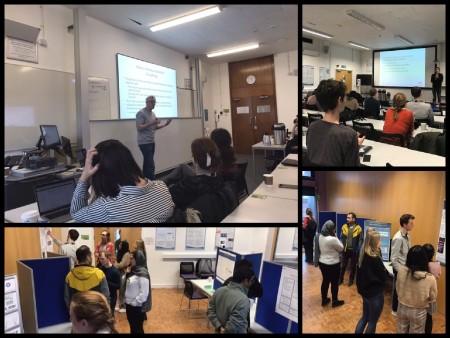
Poster session
Schedule
8th March am - Harrison 209
11:30 Arrival and coffee
11:45 Prof. Simon Schultz (Imperial College London)
"Neural manifold analysis of brain circuit dynamics in health and disease"
12:30 Catered lunch
8th March pm - Harrison 103
13:30 Dr Lucia Marucci (University of Bristol)
"Programming cells: from models to data and back"
14:15 Prof. Orkun Soyer (University of Warwick)
"Co-substrate dynamics in metabolism: from theory to experiments?"
15:00 Tea & coffee
15:30 Prof. Thomas Nowotny (University of Sussex)
"Testing mathematical models in hybrid systems experiments."
16:15 Poster session
18:00 Pub trip
9th March - Harrison 170
09:30 Prof. Aneta Stefanovska (Lancaster University)
"Is non-autonomous dynamics in mathematics sufficient to describe open systems in physics? Lessons from cellular, cardiovascular and brain dynamics"
10:15 Discussion session & breakout on opportunities and challenges in integrating experiments and models
11:00 Tea & coffee
11:30 Rebecca Poon (University of Exeter)
"Dynamics of ciliary coordination in marine invertebrate larvae."
12:15 Catered lunch
13:30 Close
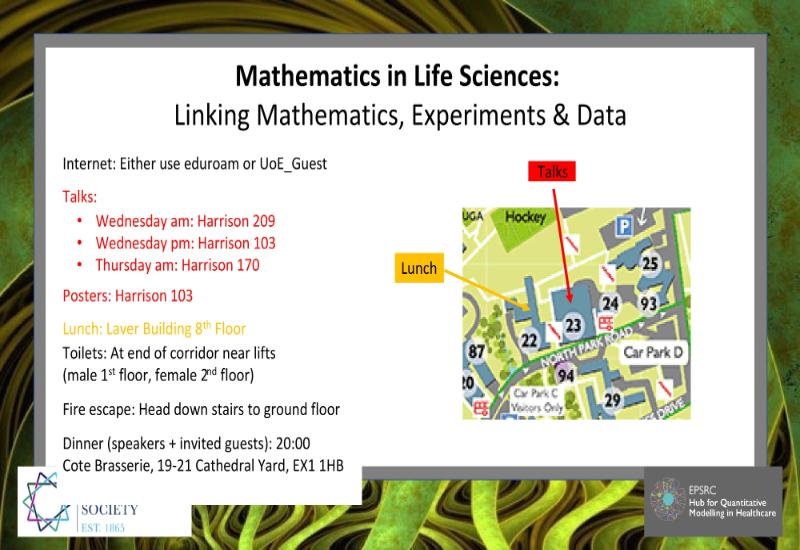
The "Uncertainty Quantification for Healthcare and Biological Systems’’ workshop took place 17th-21st April at the Lorentz Centre in Leiden, and brought together 28 academics with expertise in mathematical modelling, numerical analysis and statistics to identify the main uncertainty quantification challenges for mechanistic healthcare models.
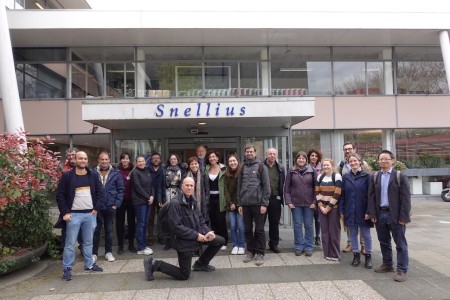
group photo of participants.
The "Uncertainty Quantification for Healthcare and Biological Systems’’ workshop took place 17th-21st April at the Lorentz Centre in Leiden, and brought together 28 academics with expertise in mathematical modelling, numerical analysis and statistics to identify the main uncertainty quantification challenges for mechanistic healthcare models. Uncertainty quantification provides a general framework for assessing and quantifying uncertainties associated with input parameters, violation of model assumptions (model discrepancy) and operating with computationally expensive mathematical models. This workshop aimed to advance the field of uncertainty quantification in healthcare modelling, with the ultimate goal of enhancing the credibility and applicability of these models in clinical decision-support. The workshop organisers would like to thank the EPSRC Hub for Quantitative Modelling in Healthcare for sponsoring this event.
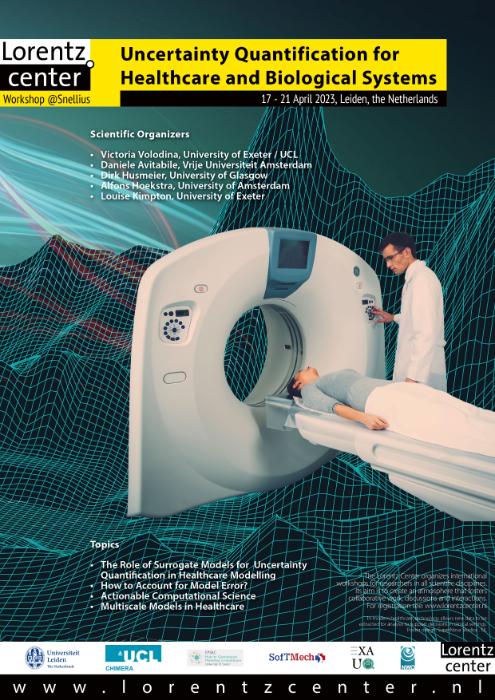
In a recent seminar that captivated members of the EPSRC Hub for Quantitative Modelling in Healthcare, Professor Maia Angelova, a distinguished scholar in data analytics and machine learning at Deakin University, illuminated the path to precision healthcare through data-driven models. The event, held on Monday, March 20, 2023, was a testament to Professor Angelova's remarkable contributions to the field of data science and her dedication to improving healthcare outcomes.
During her lecture, Professor Angelova shared the latest findings from her research lab. She discussed how data-driven models, built upon physical and physiological data, could be instrumental in the early detection of conditions like insomnia and diabetes. These models also serve as a robust foundation for pre-screening individuals using wearable devices, ushering in a new era of personalized healthcare.
Her presentation featured case studies that demonstrated the immense potential of data-driven models in healthcare. One case involved the classification of chronic back pain, leveraging a combination of images, questionnaires, and physical activity data. Another showcased the classification of insomnia and sleep patterns using physical activity data collected through actigraphy. Lastly, Professor Angelova explored glucose-insulin regulation models, offering insights into the intricate dynamics of these essential components for maintaining a healthy life and preventing diabetes.
Photo of Professor Maia Angelova
Professor Maia Angelova's work is not confined to the realm of academia. Her research is generously funded by organizations such as the National Health and Medical Research Council of Australia, the Australian Defence, The Academy of Medical Sciences, EPSRC, MRC, European FP6 and FP7 Programs, The Royal Society, The London Mathematical Society, The Australian Mathematical Society, and AMSI. Her prestigious fellowship with The Institute of Physics and her role as a member of the Council of Complex Systems underscore the recognition and respect she commands within her field.
As she continues to bridge the gap between theory and application, Professor Angelova's research increasingly delves into translational areas of health, medicine, and healthcare. Her work holds the promise of transforming healthcare, offering hope for more precise, personalized, and effective treatments for a wide range of conditions.
In closing, Professor Maia Angelova's lecture was a testament to the power of data-driven healthcare and the remarkable potential it holds for improving the well-being of individuals around the world. Her work serves as an inspiration to aspiring scientists and a beacon of hope for a healthier future.
The meeting focused on "New developments on pattern formation in biological systems" and took place on the 14-15th June 2022 from 13:30 (14th June) to 14:00pm (15th June) in the Newman Red Lecture Theatre in the Peter Chalk Centre, at the University of Exeter (Streatham Campus).

Poster session
Schedule (click here for abstracts)
14th June
13:30 Arrival and coffee
14:00 Dr. Andrew Krause (Durham University)
"A Mathematician's View of Challenges in Turing-Type Pattern Formation."
15:00 Tea and coffee break
15:30 Georgia Brennan (University of Oxford)
"From Mice, to Machine, to Man: Modelling clearance and proteopathy in Alzheimer’s disease."
16:30 Dr. Alex Fletcher (University of Sheffield)
"Understanding self-organised tissue patterning across scales."
17:30 Poster session
18:30 Drinks
15th June
09:30 Dr. Thomas Woolley (University of Cardiff)
"The Power of Noise."
10:30 Tea and coffee break
11:00 Dr. Nicolas Verschueren van Rees (University of Exeter)
"Patterns on biologically-relevant models: from arteries to reaction diffusion models on finite circular domains."
12:00 Prof. Jonathan Dawes (University of Bath)
"Pattern formation with nonlocal terms, and Alan Turing’s later work on morphogenesis."
13:00 Lunch
14:00 Close
The Hub hosted two visiting researchers from the Department of Mathematics in the University of Auckland for the week of 24th April 2023. Profs Claire Postlethwaite and Graham Donovan were visiting to collaborate with members of the hub on various problems in mathematics and medicine. Graham gave a seminar “Detecting tipping points in systems with spatial structure: applications to the asthmatic lung” that was looking at mathematical models of asthma and possible methods for warning of impending asthmatic attack.
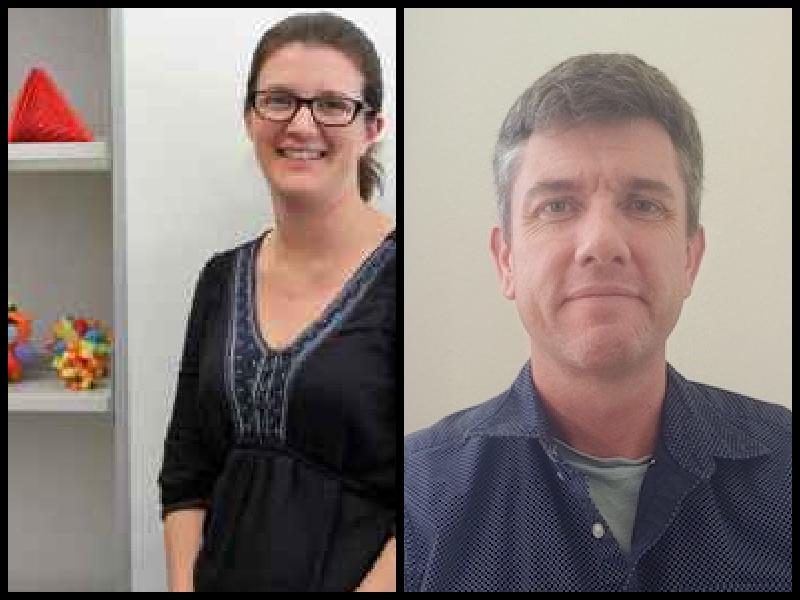
Profs Claire Postlethwaite and Graham Donovan
A harmonious convergence of two seemingly disparate domains, mathematical modeling, and medical mycology, took place at the joint meeting hosted by Exeter's EPSRC Hub for Quantitative Modelling for Healthcare (HQMH) and the Centre for Medical Mycology (CMM). This unique gathering of minds served as a platform to spotlight ongoing research endeavors within both fields, with a keen eye on nurturing potential synergies and fostering collaborative ventures among participants.
The centerpiece of the event was a captivating plenary talk delivered by Professor Nick Talbot. The talk provided insights into the intersections of mathematical modeling and medical mycology, offering attendees a profound perspective on the significance of this interdisciplinary rendezvous.
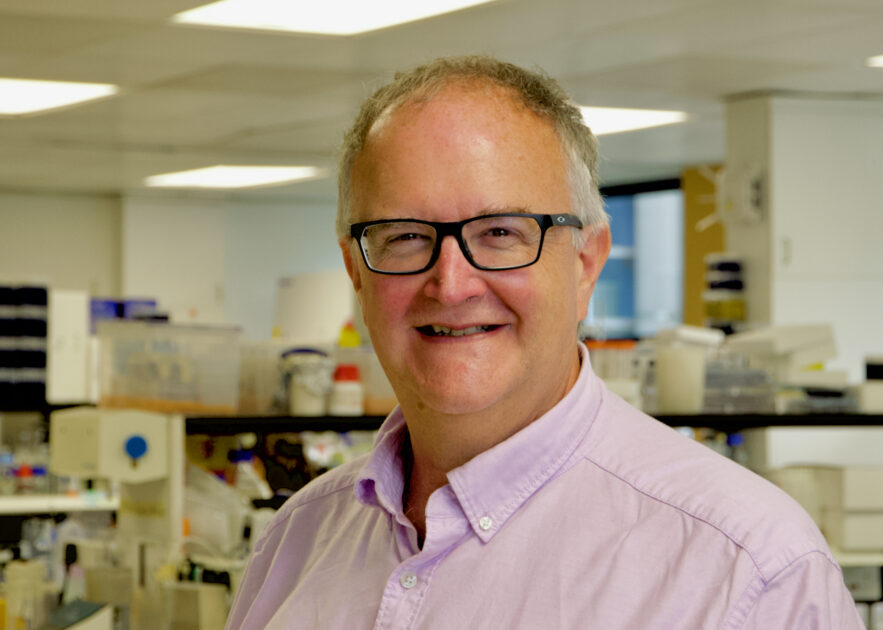
Photo of Professor Nick Talbot
One of the primary objectives of this collaborative gathering was to showcase ongoing research projects within both domains. Attendees were afforded the opportunity to delve into the cutting-edge work being undertaken by experts in mathematical modeling and medical mycology. These presentations not only shed light on the latest advancements but also paved the way for potential cross-disciplinary connections.
The meeting didn't stop at presentations; it ventured into the realm of collective brainstorming and discussion. Participants engaged in lively exchanges, pooling their collective knowledge and expertise to explore new frontiers of research and discovery. These dynamic sessions were characterized by the fervor of individuals dedicated to pushing the boundaries of knowledge.
More details: https://www.exeter.ac.uk/events/details/index.php?event=12433
